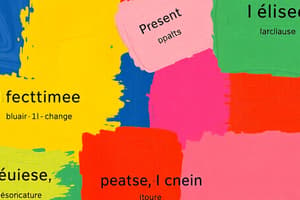Podcast
Questions and Answers
Which verb form is used to express habitual actions in the present?
Which verb form is used to express habitual actions in the present?
- Futur Simple
- Présent (correct)
- Passé Composé
- Imparfait
What is the auxiliary verb used with the verb 'partir' in the passé composé?
What is the auxiliary verb used with the verb 'partir' in the passé composé?
- être (correct)
- aller
- faire
- avoir
Which of the following endings is correct for the imparfait, using the verb 'finir' in the first person plural?
Which of the following endings is correct for the imparfait, using the verb 'finir' in the first person plural?
- -aient
- -ait
- -ions (correct)
- -ais
What is the correct future tense form of the verb 'vendre' for 'they' (ils)?
What is the correct future tense form of the verb 'vendre' for 'they' (ils)?
Which tense describes actions that were ongoing or habitual in the past?
Which tense describes actions that were ongoing or habitual in the past?
In the passé composé structure, what must always be included with the past participle?
In the passé composé structure, what must always be included with the past participle?
Which of these time expressions indicates a future event?
Which of these time expressions indicates a future event?
Which of the following sentences uses the futur simple correctly?
Which of the following sentences uses the futur simple correctly?
Study Notes
Présent
- Definition: Indicates an action happening currently or regularly.
- Formation:
- Regular verbs:
- -er: parler (je parle, tu parles, il/elle parle)
- -ir: finir (je finis, tu finis, il/elle finit)
- -re: vendre (je vends, tu vends, il/elle vend)
- Irregular verbs: être (suis, es, est), avoir (ai, as, a), aller (vais, vas, va), faire (fais, fais, fait).
- Regular verbs:
- Use:
- To express habitual actions.
- To describe current states or facts.
- For future events with a scheduled time.
Passé Composé
- Definition: Describes actions completed in the past.
- Formation:
- Auxiliary verb (avoir or être) + past participle of the main verb.
- Example: J'ai mangé (manger), Elle est partie (partir).
- Use:
- To indicate specific past actions.
- To describe events that have occurred.
- Often used with time expressions like "hier," "la semaine dernière."
Imparfait
- Definition: Describes ongoing or habitual actions in the past.
- Formation:
- Take the nous form of the present tense, drop -ons, and add endings: -ais, -ais, -ait, -ions, -iez, -aient.
- Example: Je parlais (parler), Ils finissaient (finir).
- Use:
- For background descriptions in narratives.
- To express habitual actions in the past.
- To indicate actions that were ongoing or interrupted by another action.
Futur Simple
- Definition: Indicates actions that will happen in the future.
- Formation:
- Infinitive of the verb + future endings: -ai, -as, -a, -ons, -ez, -ont.
- Example: Je parlerai (parler), Nous finirons (finir), Ils vendront (vendre).
- Use:
- To express future actions or events.
- To make predictions.
- Often used with time expressions like "demain," "la semaine prochaine."
Présent
- Indicates actions occurring currently or regularly.
- Formation of Regular Verbs:
- -er: parler (je parle, tu parles, il/elle parle)
- -ir: finir (je finis, tu finis, il/elle finit)
- -re: vendre (je vends, tu vends, il/elle vend)
- Irregular Verbs: include être (suis, es, est), avoir (ai, as, a), aller (vais, vas, va), faire (fais, fais, fait).
- Use Cases:
- Expresses habitual actions.
- Describes current states or facts.
- Applies to future events with a scheduled time.
Passé Composé
- Describes actions that have been completed in the past.
- Formation:
- Combines an auxiliary verb (avoir or être) with the past participle of the main verb.
- Example constructions: J'ai mangé (to eat), Elle est partie (to leave).
- Use Cases:
- Indicates specific past actions.
- Describes completed events.
- Often paired with time expressions such as "hier" (yesterday) and "la semaine dernière" (last week).
Imparfait
- Describes ongoing or habitual actions in the past.
- Formation:
- Derived from the nous form of the present tense; drop -ons and add endings: -ais, -ais, -ait, -ions, -iez, -aient.
- Example constructions: Je parlais (to speak), Ils finissaient (to finish).
- Use Cases:
- Provides background descriptions in narratives.
- Expresses habitual past actions.
- Indicates actions that were ongoing or interrupted.
Futur Simple
- Indicates actions that will occur in the future.
- Formation:
- Combines the infinitive of the verb with future endings: -ai, -as, -a, -ons, -ez, -ont.
- Example constructions: Je parlerai (to speak), Nous finirons (to finish), Ils vendront (to sell).
- Use Cases:
- Expresses future actions or events.
- Makes predictions about the future.
- Often used with time expressions like "demain" (tomorrow) and "la semaine prochaine" (next week).
Studying That Suits You
Use AI to generate personalized quizzes and flashcards to suit your learning preferences.
Description
Test your understanding of French verb tenses including the Present, Passé Composé, and Imparfait. This quiz covers the definitions, formations, and uses of these key tenses. Improve your French language skills with focused questions on action descriptions and their correct conjugation.



